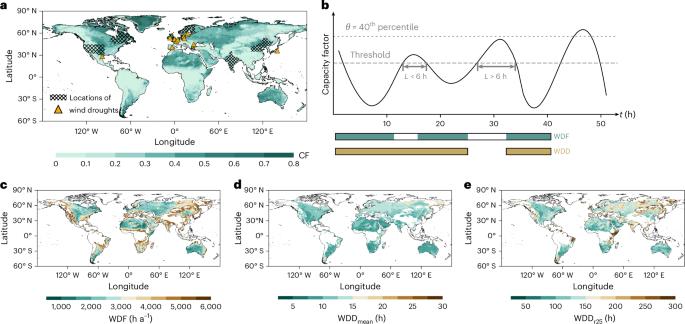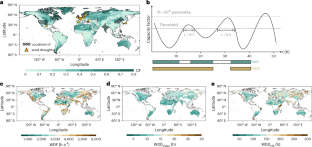Prolonged wind droughts in a warming climate threaten global wind power security
IF 27.1
1区 地球科学
Q1 ENVIRONMENTAL SCIENCES
引用次数: 0
Abstract
Prolonged low-wind events, termed wind droughts, threaten wind turbine electricity generation, yet their future trajectories remain poorly understood. Here, using hourly data from 21 IPCC models, we reveal robust increasing trends in wind drought duration at both global and regional scales by 2100, across low- and high-CO2 scenarios. These trends are primarily driven by declining mid-latitude cyclone frequencies and Arctic warming. Notably, the duration of 25-year return events is projected to increase by up to 20% under low warming scenarios and 40% under very high warming scenarios in northern mid-latitude countries, threatening energy security in these densely populated areas. Additionally, record-breaking wind drought extremes will probably become more frequent in a warming climate, particularly in eastern North America, western Russia, northeastern China and north-central Africa. Our analysis suggests that ~20% of existing wind turbines are in regions at high future risk of record-breaking wind drought extremes, a factor not yet considered in current assessments. Prolonged low wind speeds can lead to a strong reduction in wind power generation. Here, the authors show that such wind drought events become more frequent and extended under global warming, threatening energy security in some regions.


在气候变暖的情况下,持续的风旱威胁着全球风电的安全
长时间的低风事件,被称为风干旱,威胁着风力涡轮机的发电,但它们的未来轨迹仍然知之甚少。本文利用来自21个IPCC模型的每小时数据,揭示了到2100年全球和区域尺度上低二氧化碳和高二氧化碳情景下风旱持续时间的强劲增长趋势。这些趋势主要是由中纬度气旋频率下降和北极变暖所驱动的。值得注意的是,在中纬度北部国家,在低变暖情景下,预计25年回归事件的持续时间将增加20%,在非常高变暖情景下增加40%,威胁到这些人口稠密地区的能源安全。此外,在气候变暖的情况下,破纪录的极端风旱可能会变得更加频繁,尤其是在北美东部、俄罗斯西部、中国东北部和非洲中北部。我们的分析表明,约20%的现有风力涡轮机位于未来极有可能出现破纪录的极端风旱的地区,这是目前评估中尚未考虑的一个因素。
本文章由计算机程序翻译,如有差异,请以英文原文为准。
求助全文
约1分钟内获得全文
求助全文
来源期刊

Nature Climate Change
ENVIRONMENTAL SCIENCES-METEOROLOGY & ATMOSPHERIC SCIENCES
CiteScore
40.30
自引率
1.60%
发文量
267
审稿时长
4-8 weeks
期刊介绍:
Nature Climate Change is dedicated to addressing the scientific challenge of understanding Earth's changing climate and its societal implications. As a monthly journal, it publishes significant and cutting-edge research on the nature, causes, and impacts of global climate change, as well as its implications for the economy, policy, and the world at large.
The journal publishes original research spanning the natural and social sciences, synthesizing interdisciplinary research to provide a comprehensive understanding of climate change. It upholds the high standards set by all Nature-branded journals, ensuring top-tier original research through a fair and rigorous review process, broad readership access, high standards of copy editing and production, rapid publication, and independence from academic societies and other vested interests.
Nature Climate Change serves as a platform for discussion among experts, publishing opinion, analysis, and review articles. It also features Research Highlights to highlight important developments in the field and original reporting from renowned science journalists in the form of feature articles.
Topics covered in the journal include adaptation, atmospheric science, ecology, economics, energy, impacts and vulnerability, mitigation, oceanography, policy, sociology, and sustainability, among others.
 求助内容:
求助内容: 应助结果提醒方式:
应助结果提醒方式:


